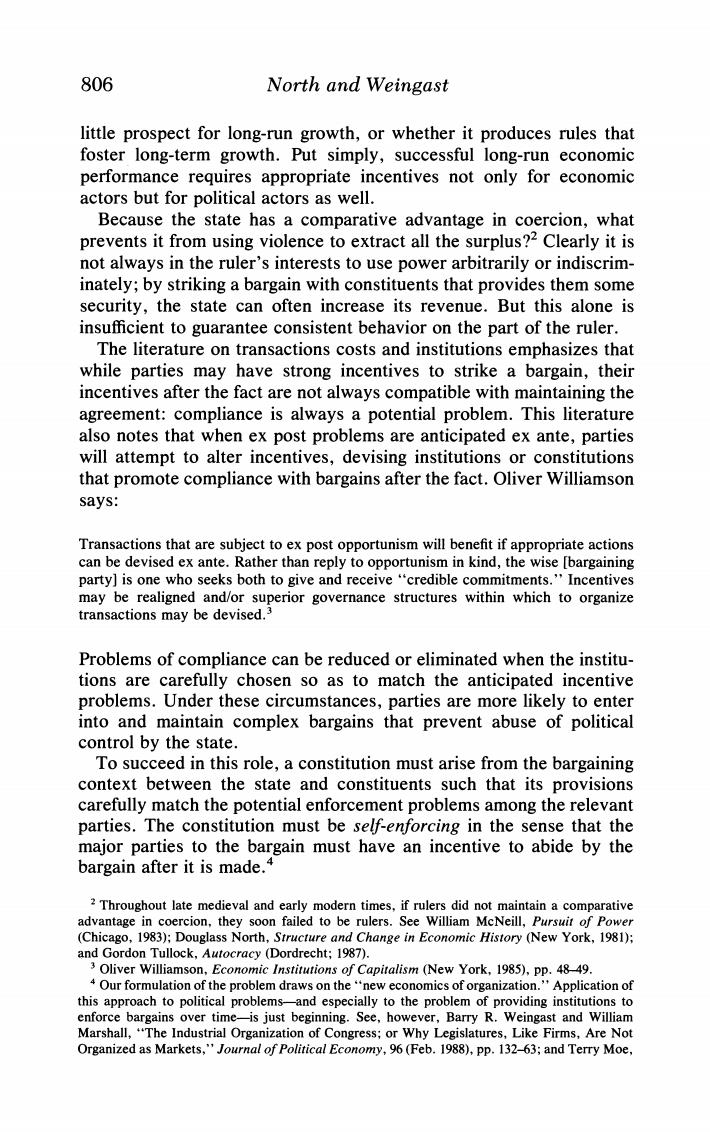正在加载图片...

806 North and Weingast little prospect for long-run growth,or whether it produces rules that foster long-term growth.Put simply,successful long-run economic performance requires appropriate incentives not only for economic actors but for political actors as well. Because the state has a comparative advantage in coercion,what prevents it from using violence to extract all the surplus?2 Clearly it is not always in the ruler's interests to use power arbitrarily or indiscrim- inately;by striking a bargain with constituents that provides them some security,the state can often increase its revenue.But this alone is insufficient to guarantee consistent behavior on the part of the ruler. The literature on transactions costs and institutions emphasizes that while parties may have strong incentives to strike a bargain,their incentives after the fact are not always compatible with maintaining the agreement:compliance is always a potential problem.This literature also notes that when ex post problems are anticipated ex ante,parties will attempt to alter incentives,devising institutions or constitutions that promote compliance with bargains after the fact.Oliver Williamson says: Transactions that are subject to ex post opportunism will benefit if appropriate actions can be devised ex ante.Rather than reply to opportunism in kind,the wise [bargaining party]is one who seeks both to give and receive "credible commitments.'Incentives may be realigned and/or superior governance structures within which to organize transactions may be devised.3 Problems of compliance can be reduced or eliminated when the institu- tions are carefully chosen so as to match the anticipated incentive problems.Under these circumstances,parties are more likely to enter into and maintain complex bargains that prevent abuse of political control by the state. To succeed in this role,a constitution must arise from the bargaining context between the state and constituents such that its provisions carefully match the potential enforcement problems among the relevant parties.The constitution must be self-enforcing in the sense that the major parties to the bargain must have an incentive to abide by the bargain after it is made.4 2 Throughout late medieval and early modern times,if rulers did not maintain a comparative advantage in coercion,they soon failed to be rulers.See William McNeill,Pursuir of Power (Chicago,1983);Douglass North,Structure and Change in Economic History (New York,1981); and Gordon Tullock,Autocracy (Dordrecht;1987). 3 Oliver Williamson,Economic Institutions of Capitalism (New York,1985),pp.48-49 4 Our formulation of the problem draws on the"new economics of organization."Application of this approach to political problems-and especially to the problem of providing institutions to enforce bargains over time-is just beginning.See,however,Barry R.Weingast and William Marshall,"The Industrial Organization of Congress;or Why Legislatures,Like Firms,Are Not Organized as Markets,"Journal of Political Economy,96(Feb.1988),pp.132-63;and Terry Moe,North and Weingast little prospect for long-run growth, or whether it produces rules that foster long-term growth. Put simply, successful long-run economic performance requires appropriate incentives not only for economic actors but for political actors as well. Because the state has a comparative advantage in coercion, what prevents it from using violence to extract all the s~rplus?~ Clearly it is not always in the ruler's interests to use power arbitrarily or indiscriminately; by striking a bargain with constituents that provides them some security, the state can often increase its revenue. But this alone is insufficient to guarantee consistent behavior on the part of the ruler. The literature on transactions costs and institutions emphasizes that while parties may have strong incentives to strike a bargain, their incentives after the fact are not always compatible with maintaining the agreement: compliance is always a potential problem. This literature also notes that when ex post problems are anticipated ex ante, parties will attempt to alter incentives, devising institutions or constitutions that promote compliance with bargains after the fact. Oliver Williamson says: Transactions that are subject to ex post opportunism will benefit if appropriate actions can be devised ex ante. Rather than reply to opportunism in kind, the wise [bargaining party] is one who seeks both to give and receive "credible commitments." Incentives may be realigned and/or superior governance structures within which to organize transactions may be de~ised.~ Problems of compliance can be reduced or eliminated when the institutions are carefully chosen so as to match the anticipated incentive problems. Under these circumstances, parties are more likely to enter into and maintain complex bargains that prevent abuse of political control by the state. To succeed in this role, a constitution must arise from the bargaining context between the state and constituents such that its provisions carefully match the potential enforcement problems among the relevant parties. The constitution must be self-enforcing in the sense that the major parties to the bargain must have an incentive to abide by the bargain after it is made.4 Throughout late medieval and early modern times, if rulers did not maintain a comparative advantage in coercion, they soon failed to be rulers. See William McNeill, Pursuit of Power (Chicago, 1983); Douglass North, Structure and Change in Economic History (New York, 1981); and Gordon Tullock, Autocracy (Dordrecht; 1987). Oliver Williamson, Economic Institutions of Capitalism (New York, 1985), pp. 4849. Our formulation of the problem draws on the "new economics of organization." Application of this approach to political problems-and especially to the problem of providing institutions to enforce bargains over time-is just beginning. See, however, Barry R. Weingast and William Marshall, "The Industrial Organization of Congress; or Why Legislatures, Like Firms, Are Not Organized as Markets," Journal of Political Economy, 96 (Feb. 1988), pp. 132-63; and Terry Moe